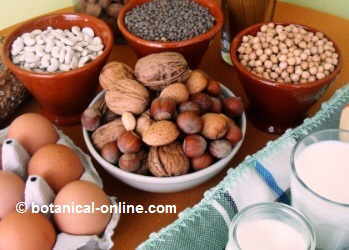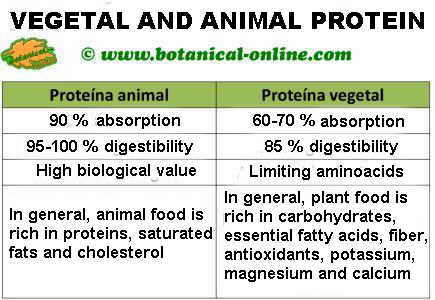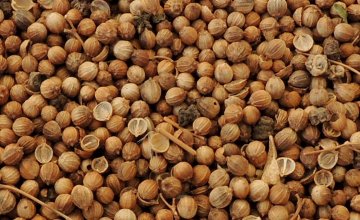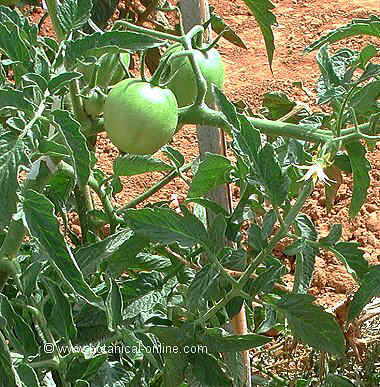Contents
- 1 Plant foods proteins and animal foods proteins
- 1.1 ANIMAL PROTEIN AND PLANT PROTEINS CHARACTERISTICS
- 1.2 Why are animal protein and plant protein different?
- 1.3 Absorption of animal protein and vegetable protein
- 1.4 Why does protein absorption depend on?
- 1.5 Digestibility of animal and plant proteins
- 1.6 Biological value of proteins and their combination
- 1.7 Foods of animal and vegetable origin
- 1.8 Conclusion: A balanced diet
Plant foods proteins and animal foods proteins
ANIMAL PROTEIN AND PLANT PROTEINS CHARACTERISTICS
Why are animal protein and plant protein different?
The most noticeable difference between animal and plant protein source is its nutritional quality.
Animal proteins contain all the essential amino acids, whereas plant foods, have to be combined to get to have all the essential amino acids.
However, this is not the only difference.
If we take into account factors such as absorption and availability of these proteins in our body, the animal protein is better assimilated than vegetable protein.
Absorption of animal protein and vegetable protein

Animal protein is better absorbed than plant protein, or, what is the same, vegetable protein has less absorption than that one from animal origin.
About 90% of animal protein is absorbed, while vegetable absorption attains about 60 or 70%.
Why does protein absorption depend on?
This is mainly due to the following factors:
- Molecule structure: animal and vegetable proteins have a different structure, and our body can easily assimilate the animal one.
- Interactions with fats, nucleic acids, fiber: These components present in the food can reduce the absorption of proteins.
- Antinutritional factors: as enzyme inhibitors present in some foods (eg trypsin inhibitors in raw vegetables) or tannins (they combine with the proteins, preventing their absorption).
- Cooking: Proper cooking helps to better digest food proteins. Raw or undercooked vegetables can be indigestible
- Diseases: Some diseases may condition the absorption of amino acids: trypsinogen deficiency, Hartnup’s syndrome, cystinuria, cystic fibrosis…
The required amount of protein intake depends on their origin. For example, to meet the same protein needs, you should consume more in case of ingesting plant protein.
Digestibility of animal and plant proteins
Protein digestibility refers to how much of absorbed protein is consumed by the organism. In terms of nutrition it is called coefficient of net protein utilization (NPU), and scientifically, this value is measured by subtracting the ingested nitrogen from fecal nitrogen.
Digestibility is related to the presence of essential amino acids: If food has a limiting amino acid, or conversely, if it contains all the essential amino acids.
Animal foods are more digestible because they contain all the essential amino acids (and has no limiting amino acids), which improves the utilization of these components so that the body can manufacture its own proteins.
Animal proteins have a very high digestibility: 98% in the egg (the largest). The use of plant proteins is 85%, since they lack some essential amino acid (limiting amino acids).
Biological value of proteins and their combination
The biological value of a protein is defined as the proportion of absorbed protein that is used by the body.
For a protein to be used by the body, it is necessary that the protein contains all essential amino acids in the required proportions:
- Animal proteins are of high biological value because they contain all the essential amino acids. The food with the highest biological value is egg protein or albumin (value 1, the maximum reference used), followed by milk protein or casein (value 0.9). Meat and fish have a biological value between 0.75 and 0.8.
- Vegetable proteins are of lower quality because they contain essential amino acids but some of them in small amounts (which is termed limiting amino acid). Wheat protein has a biological value of 0.5. For this reason we must combine plant foods to avoid these shortcomings, actually getting nutritious dishes in all aspects, not just at the protein level.
| Food | Methionine | lysine |
| Legumes are deficient in methionine | ||
| Nuts are deficient in lysine | ||
| Grains are deficient in lysine | ||
| Chickpea with couscous | The combination of food causes all amino acids to be provided. |
The table shows how the combination of two plant foods manages to obtain proteins of higher biological value. * More information: Combining proteins
Foods of animal and vegetable origin
Despite all the above considerations, we must not forget the nutritional value of food. The plant foods are absolutely necessary for health because they provide:
- Essential amino acids (some of them are limiting) and non-essential amino acids: It is clear that an unbalanced diet with protein deficiency can trigger deficit of essential and nonessential amino acids. (Some plant foods are actually poor in proteins, such as fruits)
- Carbohydrates and fiber: nutrients for energy easily, which are necessary not only for metabolism, but also to maintain healthy intestinal flora, cholesterol management, etc.
- Essential fatty acids: Omega 3 and omega 6 abound mainly in seeds and nuts, but they are also found in legumes, along with lecithins.
- Vitamins: B vitamins (except B12), vitamin C and flavonoids.
- Minerals: Vegetables are rich in potassium, magnesium and calcium.
Animal foods, in general, should be consumed in moderate doses more mainly because they provide:
- High biological value proteins, which provide all the essential and nonessential amino acids.
- Saturated fat and cholesterol
- Vitamins: B vitamins (including B12), vitamin K,
- Minerals: selenium (milk), iron (meat and fish), sodium

Summary of the differences between animal and vegetable protein explained above, prepared by Botanical-online.
Conclusion: A balanced diet
Vegetable protein has disadvantages with respect to animal protein, because it is more difficult to assimilate for the body, and also does not provide all essential amino acids. Nutritionally is not as complete and not as well absorbed as animal protein, which requires us to combine plant foods with each other to get the right amount of protein.
The combination of vegetable proteins can not only help solve some of the above drawbacks, but may also be a very nutritive mixture.
However, people with special protein needs are highly recommended to consume foods rich in animal protein, to avoid the risk of major nutritional deficiencies. For example, a lacto-ovo-balanced vegetarian diet can be very healthy.
In case of choosing a vegetarian diet, the peculiar characteristics of the vegetable protein force us to choose plant foods more carefully, combine them properly in a varied way to meet our protein needs.
We can live perfectly without meat or fish, although abstaining from eating this kind of food requires a greater commitment when planning and preparing weekly menus.
* Go on reading: Protein combinations, limiting amino acids,
![]() More information on essential fatty acids
More information on essential fatty acids








